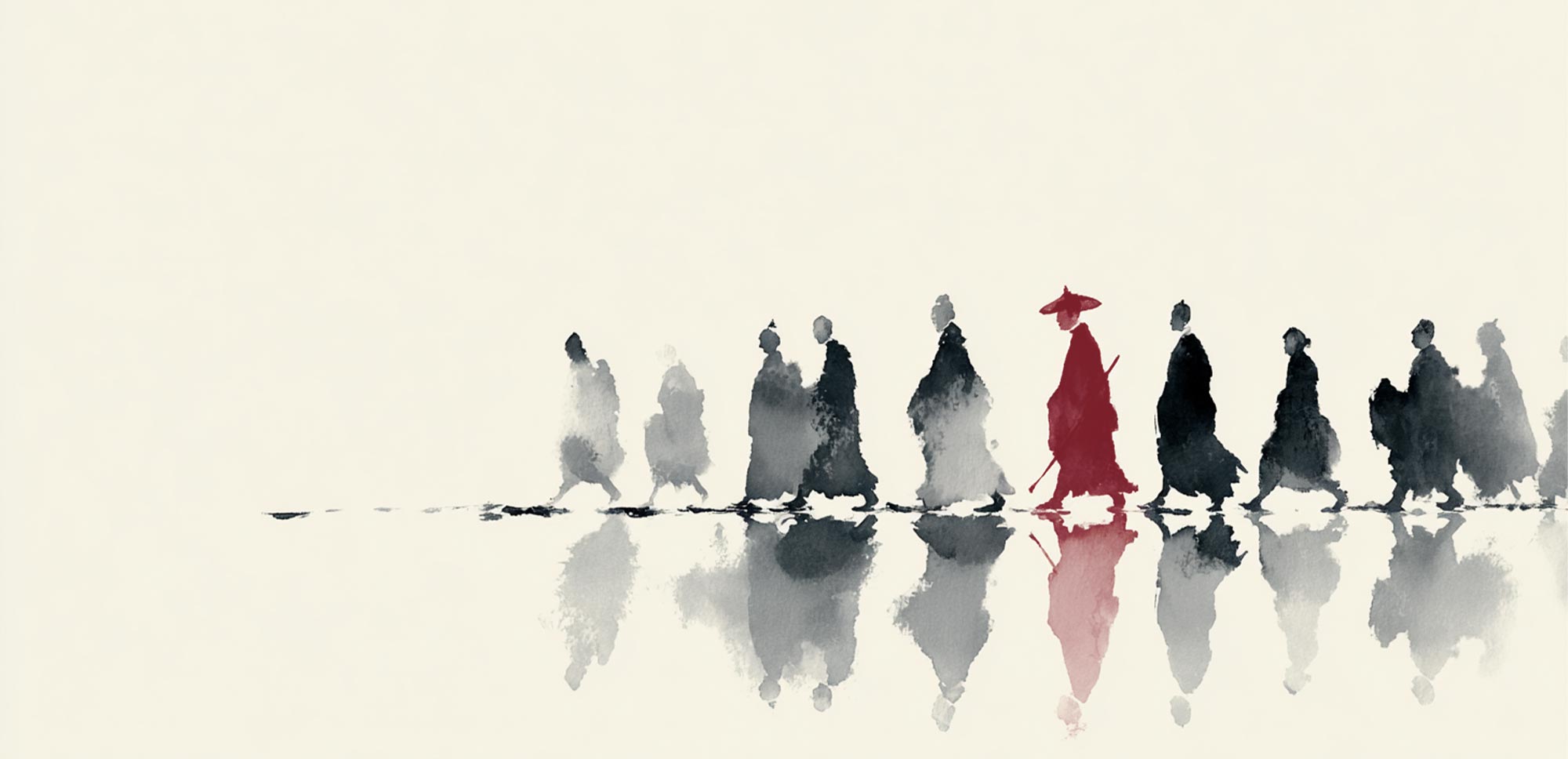Great texts regarding human thought have many virtues, and one of the most valuable is their timelessness. If we read them carefully, understanding their context and leaving aside certain cultural references that may seem distant to us today, we discover that any philosophical treatise contains profound lessons applicable to everyday life. This is the case of the Tao Te Ching, or Book of Tao, the essential work that brings together the teachings attributed to the Chinese sage Lao-Tse, who lived in the 6th century BC.
Divided into two parts and consisting of 81 short chapters, this foundational text of philosophical Taoism outlines a worldview centred on the Tao or Way, the natural flow of the universe to which one should align oneself, and the Te or Virtue, the qualities that define a person of integrity and in harmony with that flow. Despite its antiquity, its pages offer us surprisingly current keys, capable of guiding us in our personal lives and, especially, in the development of a more humane, serene and transformative leadership. We explore five teachings that invite us to become a sheng ren: a wise person who lives (and leads) in accordance with the Tao.
What I will read about in this article:
- The importance of humility
- Understanding others as equals
- Yin and yang
- The qualities of water
- The power of non-control
The importance of humility
Humility and self-awareness are essential for living and leading in tune with the Tao. “Because I dare not put myself before anyone, I am fit to be a leader”, says Lao-Tse. This teaching reminds us that truly effective leadership does not arise from the desire to assert oneself, but from the renunciation of personal protagonism in favour of the common good. Understanding our role, assuming that the leader is not above others, but at their service, is the first step towards genuine and virtuous authority. Leadership, far from being a privilege, is a responsibility that demands more listening, more searching and more commitment. Lao-Tse puts it clearly: “Is it not true that their lack of self-interest turns out to be the cause of their positive achievements?” Only when we set aside individualistic ambitions and act from inner coherence can we make an impact without dominating, guide without imposing, and inspire without overshadowing.
“Leadership, far from being a privilege, is a responsibility that demands more listening, more searching and more commitment”.
Understanding others as equals
“The wise man, when he travels, does not stray from the caravan”. This maxim from the Tao Te Ching holds a powerful lesson about leadership. For Lao-Tse, one who lives according to the Tao and Te (the Way and the Virtue), doesn‘t place himself above the group, but recognises himself as part of it. Only by being one with others can one be a true guide. Listening to others as one listens to oneself, considering the needs of those around us and walking together with the team, not ahead or above it, allows us to reach our goals with greater balance, equity and cohesion.

Today, this vision makes more sense than ever, as the idea of the inaccessible, authoritarian leader has been left behind. In its place, models based on empathy, active listening, shared vulnerability and flexibility are emerging. In a changing work environment marked by uncertainty, leading is not about imposing, but about accompanying. It’s not about controlling everything, but about building trust and cohesion so that the team moves forward together. As the Book of Tao states, “he who can esteem everyone as his own person can be entrusted with the world”. To lead is not to walk away from the caravan to give orders from afar, but to walk alongside it, in step.
In a changing work environment marked by uncertainty, leading is not about imposing, but about accompanying.
Yin and yang
Perhaps the most universal concept that Lao-Tse introduces in his work is that of yin and yang. These are two opposing and complementary forces that govern the universe, and which move away from the Manichean dichotomy of right and wrong. Assimilated to light and dark, yin and yang are behind all changes, both positive and negative. Everything has consequences and everything serves to change something: thus, from a mistake can come what we need to achieve our goals, and if we learn to calibrate our assets, we will end up achieving the expected balance, the right balance.
In the field of leadership, this vision helps us to abandon binary judgements and to accept that both successes and mistakes are part of the same cycle of learning and growth. From this perspective, every difficulty can be the seed of a solution, and every mistake an opportunity to readjust course. In a business world marked by uncertainty, cultivating this integrative view is key and allows us to calibrate our resources, accept tensions without losing our balance and move forward with greater flexibility and resilience.
“In the field of leadership, this vision helps us to abandon binary judgements and to accept that both successes and mistakes are part of the same cycle of learning and growth”.
The qualities of water
Bruce Lee’s famous phrase “Be water, my friend”, which has become a life motto for millions of people, is one of the most profound teachings of the Tao Te Ching. Water, the central symbol of Taoist thought, represents the strength of the flexible, that which flows without resisting, that which adapts without losing its essence. “There is nothing in the world softer than water”, writes Lao-Tse, “but nothing surpasses it when confronted with what is hard”. This apparent contradiction holds a powerful truth: softness, far from being weakness, can be a form of superior strength. Water does not compete with obstacles: it surrounds them, wears them down, transforms them. And in that silent, persistent gesture, it wins.
In the realm of leadership, this metaphor reminds us that to adapt is not to yield, but to understand. Rigidity in the face of change can break us, while flexibility allows us to navigate uncertainty gracefully and effectively. Leading from absolute control is as useless as trying to stop a current with our hands. Accepting the place assigned to us by the Tao (the moment, the context, the team) and acting from there, without forcing, is key to exerting a lasting influence. Only those who remain flexible in the face of pressure can calmly guide those around them, and learn to lead without imposing, to advance without pushing and to transform without destroying.
Only those who remain flexible in the face of pressure can calmly guide those around them.
The power of non-control
“The softest wins over the hardest. Nothingness penetrates where there is no crack. From this I deduce that non-action has its usefulness”. With these words, Lao-Tse introduces one of the most perplexing and powerful principles of the Tao Te Ching: wu wei, usually translated as non-action or forced non-intervention. Far from promoting passivity, wu wei proposes a form of action that is subtle and aligned with the natural flow of things. What to do when a situation is beyond one’s control? How to act when no strategy seems to work? For Taoist thinking, the answer isn’t to do more, but to do less, or even to stop doing, to allow things to find their own way. In the context of leadership, this teaching is particularly valuable, for not everything is solved by constant pressure, plans or interventions. Sometimes the wisest thing to do is to step back, trust the process and allow the team to grow on its own. Forcing the pace, cutting corners or over-intervening can have the opposite effect: it can convey insecurity, disconnection or mistrust.
As Lao-Tse warns: “If the people are difficult to govern, it is because their superior acts too much”. In the world of work, this translates into a clear maxim, which is that too much control can block people’s autonomy, creativity and commitment. Leaders who intervene only when necessary, who observe and wait, create more sustainable, reliable and effective environments. Wu wei is not an absence of leadership, but its most refined form. Trusting the natural rhythms of the team and the project, that’s the paradox of non-control, which brings us closer to the Tao, and with it, to a more just, honest and lasting leadership.
Leaders who intervene only when necessary, who know how to observe and wait, generate more sustainable, reliable and effective environments.



